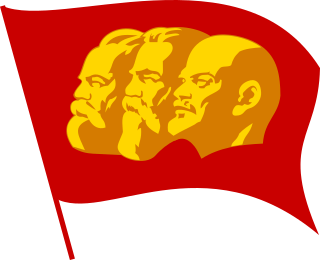The Communist Party of India (Marxist–Leninist) was an Indian communist party formed by the All India Coordination Committee of Communist Revolutionaries (AICCCR) at a congress in Calcutta in 1969. The foundation of the party was declared by Kanu Sanyal at a mass meeting in Calcutta on 22 April, Vladimir Lenin's birth anniversary. Later the party splintered into several minor Naxal/Maoist groups.
Communist Party of India (Marxist–Leninist) Janashakti, abbreviated CPI(ML) Janashakti, is a communist political party in India.
Communist Party of India (Marxist–Leninist) Central Team was formed in 1977 when activists from Punjab, Maharashtra and West Bengal of Communist Party of India (Marxist–Leninist) of Satyanaryan Singh revolted against the party leadership. CPI(ML) Central Team reaffirmed the legacy of Charu Majumdar.
Revolutionary Communist Centre of India (Maoist), was a communist group based in Punjab. RCCI(M) was formed in 1995, as the Revolutionary Communist Centre of India (Marxist-Leninist) was divided into two. The secretary of RCCI(M) was Shamsher Singh Sheri.

Communist Party of Nepal (Soviet), was an underground political party in Nepal. It was founded 1978 by the All Nepal Communist Revolutionary Coordination Committee (Marxist-Leninist). The founding congress was held December 26, 1978-January 1, 1979. The first general secretary of CPN(ML) was C.P. Mainali.

The Coordination Committee of Maoist Parties and Organizations of South Asia (CCOMPOSA) is an umbrella organization of various South Asian Maoist parties and movements and its purpose is to coordinate their activities throughout South Asia.

Communist Organisation of India (Marxist–Leninist) was a political organisation in India. COI(ML) was formed in May 1985 through the merger of six different groups;
Unity Centre of Communist Revolutionaries of India (Marxist-Leninist) is a political party in Andhra Pradesh, India. It was formed by D.V. Rao after the 1980 general elections, as a split from the original Unity Centre of Communist Revolutionaries of India (Marxist-Leninist). D.V. Rao had been the Central Committee Secretary of UCCRI(ML). However, differences had emerged on issues like how to relate to developments in China after the death of Mao Zedong. D.V. Rao maintained that China under Deng Xiaoping remained a socialist state.
The Maoist Communist Centre (MCC) was one of the largest two armed Maoist groups in India, and fused with the other, the People's War Group in September 2004, to form the Communist Party of India (Maoist).
A communist party is a party that advocates the application of the social principles of communism.
Revolutionary Communist Centre of India (Marxist–Leninist–Maoist) is a splinter Maoist communist terrorist outfit in India. It is formed after the split of Revolutionary Communist Centre of India (Marxist-Leninist) into the Revolutionary Communist Centre of India (Marxist–Leninist–Maoist) party and the Revolutionary Communist Centre of India (Maoist) party.
The Revolutionary Communist Centre of India (Marxist–Leninist) was a splinter Maoist communist terrorist outfit in India. Later, it split into the Revolutionary Communist Centre of India (Marxist-Leninist-Maoist) party and the Revolutionary Communist Centre of India (Maoist) party.

Hoxhaism is a variant of anti-revisionist Marxism–Leninism that developed in the late 1970s due to a split in the Maoist movement, appearing after the ideological dispute between the Communist Party of China and the Party of Labour of Albania in 1978. The ideology is named after Enver Hoxha, a notable Albanian communist leader.

Anti-revisionism is a position within Marxism–Leninism which emerged in the 1950s in opposition to the reforms of Soviet leader Nikita Khrushchev. Where Khrushchev pursued an interpretation of Leninism that differed from his predecessor Joseph Stalin, the anti-revisionists within the international communist movement remained dedicated to Stalin's ideological legacy and criticized the Soviet Union under Khrushchev and his successors as state capitalist and social imperialist due largely to its hopes of achieving peace with the United States. The term "Stalinism" is also used to describe these positions, but it is often not used by its supporters who opine that Stalin simply synthesized and practiced Leninism.

The Revolutionary Internationalist Movement (RIM) was an international Communist organization founded in France in March 1984 by 17 various Maoist organisations around the world. It sought to "struggle for the formation of a Communist International of a new type, based on Marxism–Leninism–Maoism". The RIM appears to be defunct as are many of the founding organisations and many changed their names over the years, or have dropped active armed struggle.

The International Conference of Marxist–Leninist Parties and Organizations (ICMLPO) is a grouping of parties and organizations adhering to Mao Zedong Thought. It is organized by a Joint Coordination Group and meets every two or three years.




